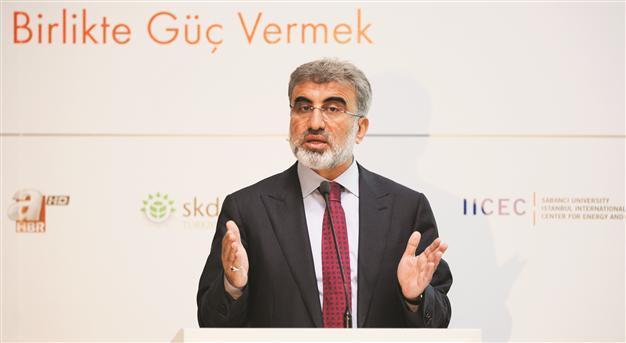Turkey seeks Canada, US aid on shale gas reserves
Erdinç ÇELİKKAN ANKARA / Hürriyet

Turkey’s state-run energy company TPAO will focus on shale gas reserves in the Thracian region and Southeastern Anatolia, says Taner Yıldız. AA photo
Turkey has begun to carry out hydraulic fracturing operations to extract shale gas from the wells in the Thracian and southeastern regions, where 4.6 trillion cubic meters of reserves have been detected.
Energy Minister Taner Yıldız said there was shale gas potential in the Thracian, southeastern Anatolian, and inner Anatolian regions.
“[Turkey’s state-run energy company] TPAO had been working to extract the oil and the gas deeper there, which cannot be extracted in traditional ways, for the last four years. The company specifically focuses on the Thracian region and southeastern Anatolia. The operations will start in the old wells there to make them productive again by means of the hydraulic fracturing methods by the end of this year,” Yıldız said.
TPAO already started preparations“Shale gas is really something both for us and for the world. The TPAO and Turkish private sector will make more investment on shale in the near future by collaborating with foreign companies,” he noted.
TPAO has already started to make initial preparations to explore and to produce shale gas by itself in the Thracian region, Yıldız noted. “We created a special team for this. If we become successful in the region, we’ll continue our drilling activities there. For instance, the U.S. is very ambitious in shale gas production.
The country produces 1,000 cubic meters gas for $105 to $110 and sells it at the same price. If we can start to produce our shale gas, it will be very economical for us,” Yıldız said.
Turkish delegation visits US, CanadaMeanwhile, a delegation from the Ministry of Energy went to the United States and Canada to examine the existing wells there and to meet the representatives of the companies in the sector.
The delegation members specifically examined the hydraulic fracturing operations for shale gas there.
Furthermore, they visited a number of R-D facilities which specialized in shale gas drilling and production. The delegation members also made short presentations about the new Petroleum Law of Turkey.
Shell and TPAO began exploring for shale gas in the eastern province of Diyarbakır’s Sarıbuğday-1 natural gas field in September 2012.
Five vertical wells were opened in the region and two horizontal wells are planned, Yıldız noted. “TPAO made one of the vertical well drillings by itself,” he added.
The U.S.-based Energy Information Agency (EIA) estimated that the Dadaş Shale in the Southeast Anatolian Basin and the Hamitabat Shale in the Thrace Basin contain 163 trillion cubic feet (tcf) (4.6 trillion cubic meters) of risked shale gas in-place, with 24 tcf (651 bcm) as the risked, technically recoverable shale gas resource. In addition, they estimated that these two shale basins also contain 94 billion barrels of risked shale oil in-place, with 4.7 billion barrels as the risked, technically recoverable shale oil resource.
Turkey could meet its gas demand for 14 years by using the technically recoverable shale gas resource, 651 bcm, the report estimated.
